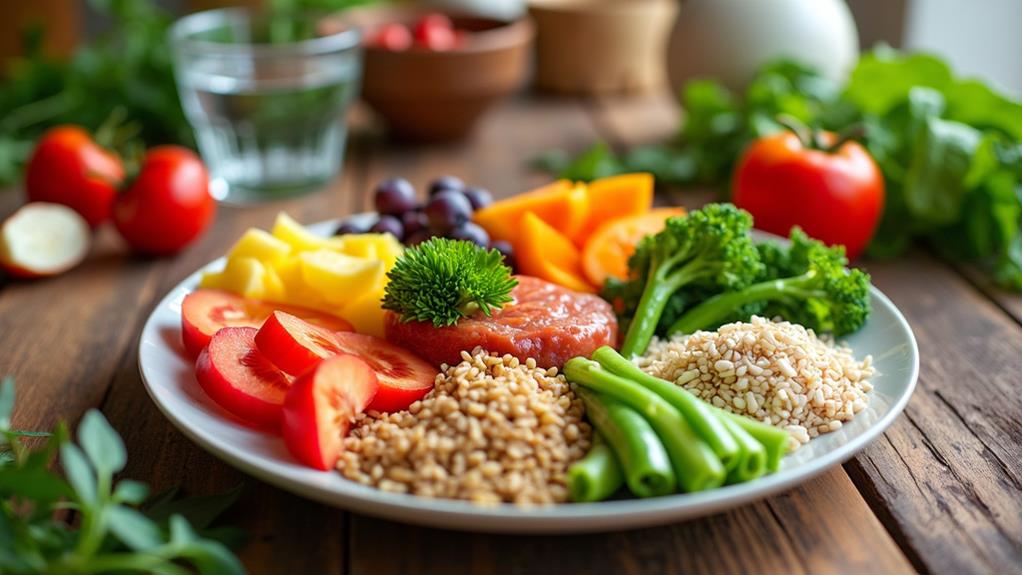When you think about achieving ideal health, the Mediterranean diet often comes to mind. It's rich in whole, nutrient-dense foods that support your body in numerous ways. Ever wondered why extra virgin olive oil, fatty fish like salmon, and legumes such as lentils are so highly recommended? Each of these foods brings unique health benefits that you can't afford to miss. But that's just the beginning. How do fresh vegetables, whole grains, and even red wine fit into this picture? Let's explore how these top 10 foods can transform your well-being. Incorporating these ingredients into your meals is simpler than you might think, especially when you focus on fresh, unprocessed options. Taking steps to adopt raw food, such as enjoying crisp salads with spinach and arugula or snacking on raw nuts and seeds, can amplify the health benefits even further. By embracing these wholesome choices, you set the stage for a healthier lifestyle that resonates with the core principles of the Mediterranean diet.
Olive Oil
Olive oil, often called "liquid gold," is a cornerstone of the Mediterranean diet. You'll find it used in everything from salad dressings to sautéing vegetables. The secret to its rich flavor and health benefits lies in the olive varieties and meticulous oil production methods.
Understanding olive varieties is key to appreciating olive oil. Varieties like Arbequina, Picual, and Koroneiki each offer different flavors and nutritional profiles. Arbequina olives produce a smooth, mild oil perfect for drizzling over dishes, while Picual gives a robust, peppery kick ideal for cooking. Koroneiki, known for its high polyphenol content, offers a balance of flavor and health benefits.
Oil production plays a vital role too. You should look for extra virgin olive oil, which is obtained through cold pressing. This method preserves the olives' natural antioxidants and nutrients. Avoid refined or blended oils, as they often undergo chemical processes, stripping away beneficial compounds.
Incorporating high-quality olive oil into your diet can promote heart health, reduce inflammation, and enhance the flavor of your meals. So, next time you're at the store, choose an olive variety and oil production method that suits your taste and nutritional needs.
Fatty Fish
When it comes to nutrient-dense foods, fatty fish is a standout in the Mediterranean diet. Not only are these fish loaded with essential nutrients, but they're also one of the best Omega 3 sources you can include in your meals. These Omega-3 fatty acids offer numerous fatty acid benefits that are vital for your overall health.
Incorporating fatty fish into your diet can help you:
- Boost heart health: Omega-3s reduce inflammation and lower the risk of heart disease.
- Enhance brain function: These fatty acids support cognitive function and may reduce the risk of neurodegenerative diseases.
- Improve mood: Regular consumption of Omega-3s has been linked to lower rates of depression and anxiety.
- Support joint health: The anti-inflammatory properties of Omega-3s can help reduce symptoms of arthritis.
Salmon, mackerel, sardines, and anchovies are excellent choices. These fish are not only rich in Omega-3s but also provide high-quality protein and essential vitamins like D and B12. Aim to include fatty fish in your diet at least twice a week to reap these fatty acid benefits. By doing so, you'll be taking a significant step towards a healthier, more balanced lifestyle.
Fresh Vegetables
Fresh vegetables are the cornerstone of the Mediterranean diet, offering a plethora of vitamins, minerals, and antioxidants essential for peak health. When you think about it, adding vegetables to your meals is an easy way to boost nutrition. From bell peppers to cucumbers, the crunchy texture of fresh veggies makes every bite satisfying.
You'll find colorful varieties like tomatoes, carrots, and eggplants adding vibrancy to your plate. These vegetables aren't just visually appealing; they're also packed with nutrients. For instance, tomatoes provide lycopene, an antioxidant linked to reduced heart disease risk, while carrots are rich in beta-carotene, promoting good vision.
Including a mix of vegetables in your diet can help you meet your daily fiber needs, which is key for digestive health. Salads, stir-fries, and roasted vegetable medleys are just a few delicious ways to incorporate more veggies. Don't forget leafy greens like spinach and kale; they're low in calories but high in iron and calcium.
Ultimately, fresh vegetables are a simple, tasty way to enhance your meals and support overall well-being. So, load up your plate with these nutrient-dense foods and enjoy the benefits they bring.
Whole Grains
While fresh vegetables form the backbone of the Mediterranean diet, whole grains play an equally important role in providing sustained energy and essential nutrients. By incorporating whole grains into your meals, you can take advantage of numerous whole grain benefits such as improved digestion, reduced risk of heart disease, and better weight management.
Whole grains are packed with fiber, vitamins, and minerals that are often stripped away during the refining process. This makes them a healthier choice compared to their refined counterparts. Additionally, whole grains have a lower glycemic index, which helps in maintaining stable blood sugar levels.
Some popular ancient grain sources you should consider include:
- Quinoa: A complete protein that's also rich in iron and magnesium.
- Farro: An excellent source of fiber and a great addition to salads and soups.
- Barley: Known for its high fiber content, which can help lower cholesterol.
- Bulgur: Quick to cook and perfect for dishes like tabbouleh.
Incorporating these ancient grain sources into your diet not only boosts your nutrient intake but also adds variety and flavor to your meals. Embrace whole grains to enhance your health and align with the Mediterranean way of eating.
Nuts and Seeds
Although whole grains are a cornerstone of the Mediterranean diet, nuts and seeds bring their own set of incredible benefits to the table. You're probably already familiar with popular choices like almonds and walnuts, but don't overlook the power of pistachios. The benefits of pistachios are impressive; they're packed with fiber, protein, and healthy fats, which help to lower cholesterol and reduce heart disease risk.
Incorporating nuts and seeds into your diet is easy and versatile. You can toss a handful into your salads or mix them into your yogurt for added crunch. Don't forget about seed butters; they're a fantastic alternative to traditional spreads. Almond butter and tahini (made from sesame seeds) offer rich flavors and are loaded with nutrients like vitamin E, magnesium, and antioxidants.
Seeds like chia and flax are nutritional powerhouses. Sprinkle them over your morning smoothie or oatmeal for a boost of omega-3 fatty acids, which are essential for brain health.
In short, nuts and seeds are small but mighty. They provide a wealth of health benefits and can be seamlessly integrated into your daily meals. Enjoy them as snacks or ingredients to elevate your Mediterranean diet.
Legumes
Nuts and seeds aren't the only small wonders in the Mediterranean diet. Legumes, including beans, lentils, and peas, are nutritional powerhouses you shouldn't overlook. They're packed with protein, fiber, and essential nutrients, making them a staple for anyone aiming for peak health.
When you integrate legumes into your diet, you're reaping numerous bean benefits. They're excellent for heart health, helping to lower bad cholesterol levels and stabilize blood sugar. Plus, they're rich in antioxidants, which combat inflammation and support overall wellness.
Lentil nutrition is equally impressive. These tiny legumes are loaded with iron, folate, and magnesium, which are vital for energy production and nervous system function. Lentils are also a great source of plant-based protein, making them a perfect meat substitute in various dishes.
Consider adding these legumes to your meals:
- Chickpeas: Great in salads, soups, and hummus.
- Black beans: Perfect for stews, tacos, and rice dishes.
- Lentils: Ideal in soups, curries, and as a meat alternative.
- Peas: Excellent in stir-fries, pasta, and casseroles.
Fruits
When it comes to vibrant health, fruits in the Mediterranean diet are not just delicious; they're essential. Bursting with vitamins, minerals, and antioxidants, fruits provide a plethora of health benefits that can't be ignored. Citrus fruits, for instance, are a staple in this diet. They're packed with vitamin C, which boosts your immune system, aids in collagen production, and enhances iron absorption. Oranges, lemons, and grapefruits are perfect examples of citrus fruits that can add zest and health benefits to your meals.
Don't limit yourself to just citrus fruits, though. The Mediterranean diet also includes a variety of exotic fruits that can tickle your taste buds while nourishing your body. Think figs, pomegranates, and dates. Figs are high in fiber and potassium, making them great for digestion and heart health. Pomegranates are antioxidant powerhouses that help reduce inflammation and improve heart health. Dates, rich in natural sugars, provide a quick energy boost and are packed with essential nutrients like magnesium and vitamin B6.
Incorporating a diverse range of fruits into your diet guarantees you're getting a wide array of nutrients, keeping your meals exciting and your health in check. Enjoy the sweet benefits!
Herbs and Spices
Infusing your meals with herbs and spices isn't just about flavor; it's about tapping a treasure trove of health benefits. These aromatic additions can elevate your dishes and boost your well-being. In the Mediterranean diet, herbs and spices play a vital role in enhancing both taste and nutritional value.
Consider the rosemary benefits as you sprinkle it on your roasted vegetables or grilled meats. Rosemary is rich in antioxidants and anti-inflammatory compounds, which can improve digestion and boost your immune system. This fragrant herb might even enhance your memory and concentration.
Oregano advantages shouldn't be overlooked either. This potent herb is a powerful source of vitamins A, C, and K, and it's known for its antibacterial and antiviral properties. Adding oregano to your meals can help fight off infections and support your overall health.
Basil: Great for its anti-inflammatory properties and ability to promote heart health.
Thyme: Known for its antiseptic and antibacterial qualities.
Parsley: Packed with vitamins and can help detoxify your body.
Mint: Aids in digestion and offers a revitalizing flavor.
Greek Yogurt
Dive into the creamy world of Greek yogurt, a staple in the Mediterranean diet that's as delicious as it is nutritious. You'll find it's packed with protein benefits, making it an excellent choice for breakfast, a snack, or even dessert. Unlike regular yogurt, Greek yogurt undergoes a straining process that removes much of the whey, resulting in its thick, creamy texture and high protein content.
One of the standout features of Greek yogurt is its protein benefits. With approximately twice the protein of regular yogurt, it helps keep you feeling full longer, supports muscle repair, and aids in overall body maintenance. It's a fantastic option if you're looking to increase your protein intake without consuming meat.
Greek yogurt also promotes gut health, thanks to its rich supply of probiotics. These live bacteria are essential for maintaining a healthy digestive system. They can help balance your gut flora, reducing issues like bloating and constipation. Including Greek yogurt in your diet can enhance your overall well-being by improving digestion and supporting a robust immune system.
Red Wine
After enjoying the creamy richness of Greek yogurt, let's explore another beloved component of the Mediterranean diet: red wine. Sipping a glass of red wine isn't just a treat for your taste buds; it also offers numerous health benefits. Rich in antioxidants like resveratrol, red wine can promote heart health and longevity when consumed in moderation.
When it comes to wine pairing etiquette, you'll want to enhance your dining experience by matching the right wine with your meal. A robust red like a Cabernet Sauvignon pairs wonderfully with red meat, while a lighter Pinot Noir complements poultry and vegetables.
- Balance: Guarantee the flavors of the wine and the dish are balanced.
- Intensity: Match the intensity of the wine with that of the food.
- Acidity: Pair acidic wines with fatty foods for a delightful contrast.
- Sweetness: Sweet wines go well with desserts and spicy dishes.
Understanding the wine making process can deepen your appreciation. From grape harvesting to fermentation, each step affects the wine's flavor profile. As you savor your glass, remember the craftsmanship involved in transforming simple grapes into a sophisticated drink. Cheers to your health and enjoyment!
At a Glance
By embracing these top Mediterranean diet foods, you're taking a significant step toward better health. Incorporate olive oil, fatty fish, fresh vegetables, whole grains, and an array of nuts and seeds into your meals. Don't forget the sweetness of fruits, the flavor of herbs and spices, the creaminess of Greek yogurt, and the occasional glass of red wine. Together, these choices will help reduce inflammation, promote heart health, and enhance your overall well-being. Start your journey today!





